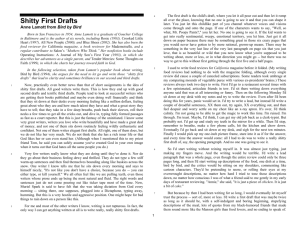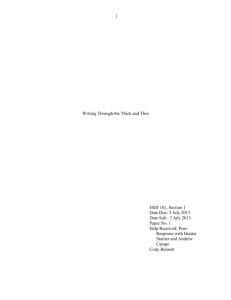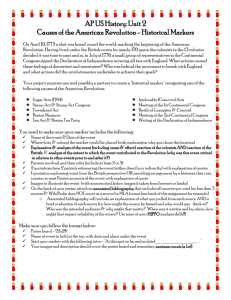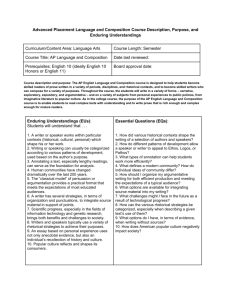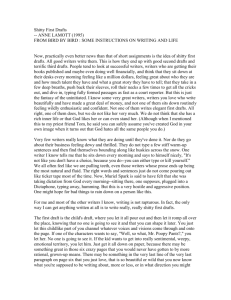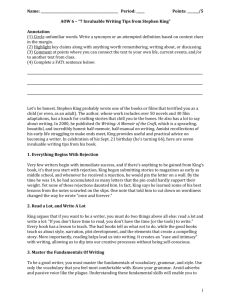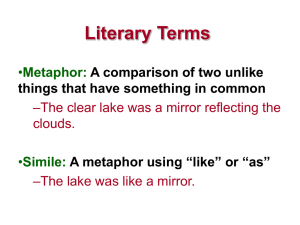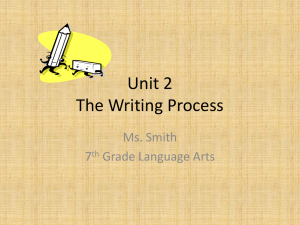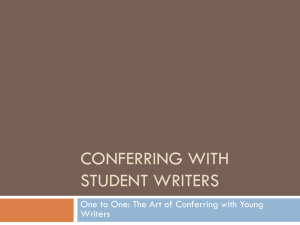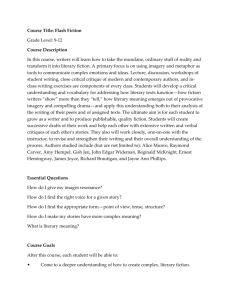From Plebeian to Pro with the Prose Process
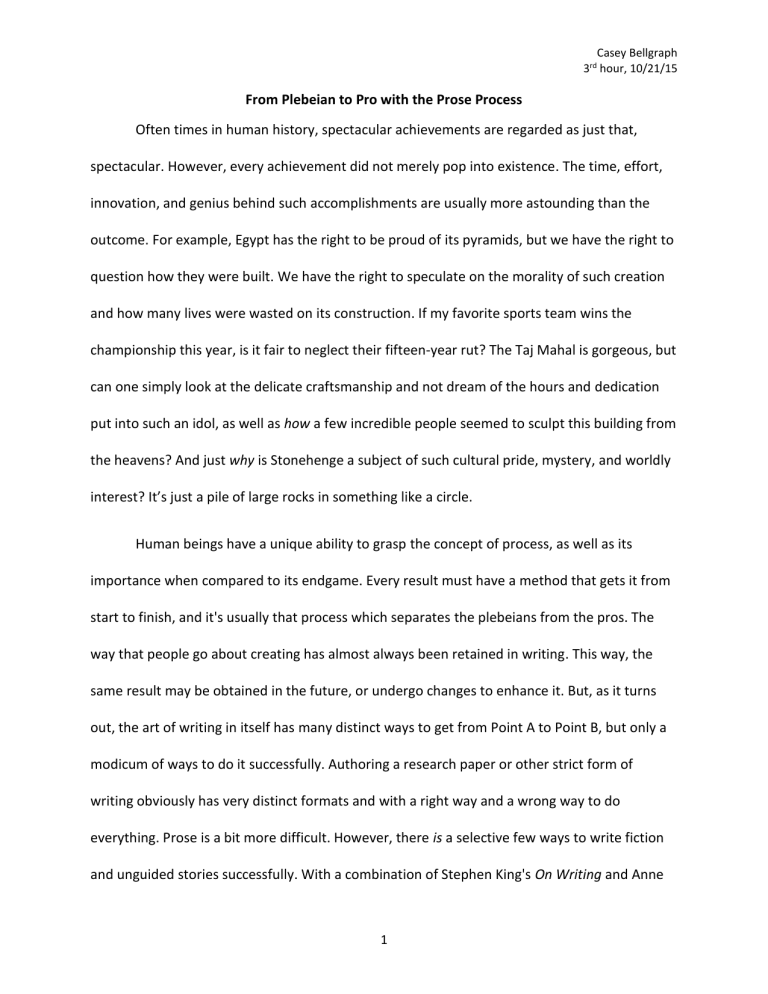
Casey Bellgraph
3 rd hour, 10/21/15
From Plebeian to Pro with the Prose Process
Often times in human history, spectacular achievements are regarded as just that, spectacular. However, every achievement did not merely pop into existence. The time, effort, innovation, and genius behind such accomplishments are usually more astounding than the outcome. For example, Egypt has the right to be proud of its pyramids, but we have the right to question how they were built. We have the right to speculate on the morality of such creation and how many lives were wasted on its construction. If my favorite sports team wins the championship this year, is it fair to neglect their fifteen-year rut? The Taj Mahal is gorgeous, but can one simply look at the delicate craftsmanship and not dream of the hours and dedication put into such an idol, as well as how a few incredible people seemed to sculpt this building from the heavens? And just why is Stonehenge a subject of such cultural pride, mystery, and worldly interest? It’s just a pile of large rocks in something like a circle.
Human beings have a unique ability to grasp the concept of process, as well as its importance when compared to its endgame. Every result must have a method that gets it from start to finish, and it's usually that process which separates the plebeians from the pros. The way that people go about creating has almost always been retained in writing. This way, the same result may be obtained in the future, or undergo changes to enhance it. But, as it turns out, the art of writing in itself has many distinct ways to get from Point A to Point B, but only a modicum of ways to do it successfully. Authoring a research paper or other strict form of writing obviously has very distinct formats and with a right way and a wrong way to do everything. Prose is a bit more difficult. However, there is a selective few ways to write fiction and unguided stories successfully. With a combination of Stephen King's On Writing and Anne
1
Bellgraph
Lamott's "Shitty First Drafts", anyone from an aspiring writer to someone with a love for the written word can take away quite a lot.
Anyone who has ever allowed a utensil brimming with ink or graphite to put words down on paper has been told to write a first draft first. And, likewise, anyone who's ever authored for someone else's viewing can agree that there is one thing that they don't do enough of: writing bad first drafts. "Shitty First Drafts" was Lamott's way of say that it is ok, it’s necessary, and that it needs to be done more. She recounts that her first step in eliminating self-doubt is to put her thoughts down on paper: a down draft. More specifically, even after years of writing, her starting of a piece is always plagued with something like shame and a feeling of imminence. The ball just can’t get rolling. For fear of failing, this author resorts to minute distractions to ease her mind after an initial attempt, followed by forcing herself to realize that nobody will witness that attempt, for better or for worse. Pen meets paper. The following day is where the magic enters and confidence ensues. A colored pen destroys most of the evidence of her literary crimes and gives rise to a second draft. The up draft, as it were, is where Lamott finds confidence, where she can fix up her baby. And before sending her child off in the mail, they must visit the dentist. The dental draft is where the fine-tuning and last details come from, insuring that no tooth is damaged or in bad shape. The focus of the "Shitty First
Drafts" excerpt was, in all truth, to trust your gut and fix whatever damage lies in its wake without feeling bad about that damage.
Lamott, while being a distinguished writer and literary artist, plainly puts that the process can be equivalent to pulling teeth. How then, are we to take her advice? This issue can be settled most accurately with another question; when did we stop trusting our instincts?
2
Bellgraph
Humans have gotten as far as we have by trusting our instincts and urges. Studies have even proven that, on average, our "gut feelings" have a higher likelihood of being right. The bulk of this piece is a fantastic tool for writers large and small. If you don't second guess yourself on the get-go, you are more likely to have an intriguing, well-written collection of words by the end. A very possible downfall for Lamott's process though, is that many people cannot simply put down their uninterrupted thoughts without fixing the obvious errors. While writers should more often be comfortable with their private, bad writing, there are those who may become attached to their errors and begin to accept them if they are left to stew. In the end, each writer is different, but it seems that the vast majority of good ideas are either stamped out by early editing or faded out because they don't return to the mind, or the pen for that matter.
And when it comes down to it, isn't a lost idea worse than a bad idea?
Truthfully, my own style does not include nearly enough trashy first drafts. When writing on a deadline, there is seldom ever more than a single draft, and when there is, I never allow the first one to be bad. It may not be perfect, but it’s never bad. As I'm constructing the building that is my literature, if I see a bent or broken beam that I'm using, I replace it. This changes the make-up of the whole project! I would like to incorporate more freedom into my construction so that it can really flow. I love conserving my ideas, and I hate killing them simply because they slipped my mind. It would be much easier to erase a mistake than to erase a doomed path of words.
While not every author is same, there are many that are able to break into mainstream success, and most have different approaches. Of all the notable contemporary authors, one name stands king above the rest. Steven King's On Writing is his first real attempt to share his
3
Bellgraph process while heightening the ability and competence of others. In producing over forty works or literature and becoming a household name that has influenced hundreds of other writers, movies, games, and the like, if King has something to say about writing, it seems a wise choice to listen.
Before delving into his actual routine, Stephen King first thrusts forward his thoughts on the basis of writing. In every writer's "toolbox", they should possess a firm understanding of grammar, it's rules, and when it's acceptable to break them. Coupled with these rules, a writer is nothing without vocabulary and a sense of good and evil. He goes on to state that adverbs and the passive tense are the real evil, and if one is to write good prose, they must do a superfluous amount of reading and writing in order to absorb as much as possible. The colloquialisms of the written word are far different from those found in speech, and it would be wise to learn them before stepping into their territory.
Mr. King may not write his work in two days, like Lamott, but he does write it in two stages. Door closed: write what you write and follow your heart. This is the draft that is purely one's own imagination. He puts his thoughts down and lets the story take him for a ride. King states his admiration of situational works as well, exemplifying Misery and Cujo as "what-ifs" that became full-fledged novels. Before any changes are made, the story should be allowed to evolve and sway, to bend and, hopefully, stay intact. Also acknowledged was the fact that the protagonist(s) of a novel are often the hardest character(s) to capture. They must be real and they must be believable, whereas an antagonist need only be the opposite, and tend to be more fun to create. After the stage is set and these characters are allowed to romp around, Mr.
King suggests tucking the finished manuscript away in a drawer for a minimum of six weeks.
4
Bellgraph
Once you have forgotten, you are allowed to remember. Once you have gotten distracted and pulled away from your own work, the puppet strings dissolve and it becomes real. It's time to discover your own story. Then comes his second stage: door open. Go back through your first draft and do your editing, while also allowing a few others to peak into your world and offer their suggestions, comments, and questions. Allowing your work to meet the world, especially to someone of whom you are writing specifically for, gives it room to breathe and even go through a post-evolution. And, as one publisher had passed to King, the formula for success is
Final Draft=1st draft-10%. Take out the meaningless words. Filtration through this last grate of editing goodness is what gives a story it's shine, and this is as crucial to it's success as the ink in the pen.
Many people who write do so because of it's cathartic effect on them, so for many of them, such a process as King’s may be impossible. Simply creating a set of rules and characters to follow those rules without any predisposition, while also breaking up a writing's flow, is extremely difficult for some people. This is rightly so, as a vast number of people are held hostage by a physical craving to continue writing and planning until completion and, for those people, the process of Stephen King may not be the process for them. For those looking to try something new, trying to keep their stories fresh and memorable without getting blindingly attached, this is the guide for you. Plotless writing has many benefits in the way of spontaneity, realism, and creativity, but it can also end in a dead, unsatisfying halt. Likewise, the act of basing a story on a basic what-if situation is absurdly simple-minded, but it may provide exhilaration and life for some works. All arguments aside, King knows his trade, and in most
5
Bellgraph circumstances, his processes of writing would assist anyone in the spectrum of literature, even if they only took away that adverbs and the passive tense are evil.
Of all of the writers I've come across, I have never felt such a connection as I do with
Stephen King, and not just for a cliché sense of self. Similarities between his works and mine exist. Because of this, I'm inclined to agree with nearly every part of his writing process. It seems beneficiary to submit my own, uninterrupted writing ideas to a time capsule that I can dig up later for a fresh look. Then encouraging a region of social critique and palaver to further push my work to reality and fruition seems a relaxed, sensible approach to writing.
Literature and its many forms provide a terrific medium for knowledge and imagination to flow, and it always stems from creation. Creation always has a process. While noting the many similarities between King and Lamott's views on the drafting stage of writing, as well as their willingness to express distress in what they do, they come together and form a very solid feel for how to produce a well-crafted work of prose. Getting the initial thoughts to paper and taking slow, stable steps seems to be a common view for initiating the journey. Acknowledging your mistakes and allowing others to acknowledge them as well is a strong indicator of how the public will react to the work. These central ideas, mixed with the basic knowledge of the written English word, appear to be a rather foolproof roughing of what a novel should look like.
On the basis of writing, the plot of a book or the moral of a story will not mean much if the writing itself is less than adequate. Mastering these skills, tactics, and literary techniques allows for smoother, better translations between all human beings. Without the written language, spoken language would begin to dull. One of the great civilizing aspects of our species is written language, and this language is meaningless, unless it is done with a process.
6
